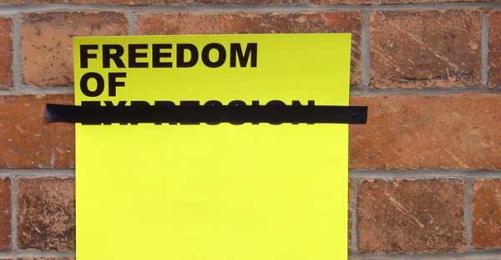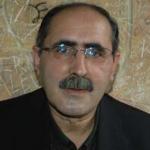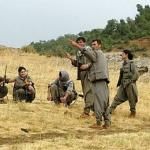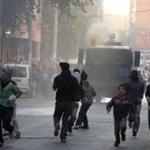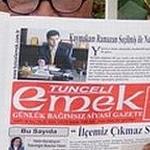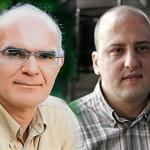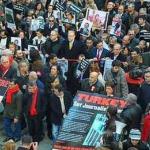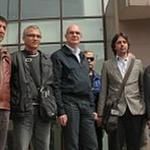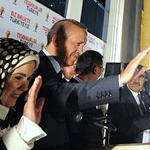According to the BİA 2010 Media Monitoring Report, 220 people, 104 of whom are journalists, were tried in the scope of freedom of thought and freedom of expression in 2010. The fines handed down to Turkey by the European Court of Human Rights (ECHR) increased to TL 547,300 (€ 281,100). 33 people were sentenced to imprisonment of 365 years and three months in total and monetary fines amounting to TL 49,200 (€24,500) under the Anti-Terror Law. 30 journalists are in prison.
On 56 pages, the report sums up the struggles of 777 people under the headings "killed journalists", "attacks and threats", "arrests and detentions", "trials related to press freedom and freedom of expression", "corrections and legal redress", "reactions to censorship and monopolization", "European Court of Human Rights", and "RTÜK applications".
The report cannot fully encompass all breaches of press freedom and freedom of expression. It rather aims at giving an idea about the situation regarding the quantity and quality of violations.
Killed journalists
Cihan Hayırsevener: On 15 October, the trial on the murder of journalist Cihan Hayırsevener started before the Istanbul 10th High Criminal Court. Hayırsevener was the General Publications Director of the Güney Marmara'da Yaşam newspaper ('Life in Southern Marmara') published in Bandırma (Balıkesir). He was killed on 18 December 2009. Among the twelve defendants on trial are triggerman suspect Serkan Erkkuş (detained), Ilk Haber newspaper publishing coordinator Engin Arıcan, the Bandırma Deputy Mayor, Talip Yıldız (detained), and members of the Kuruoğlu family who is publishing the Ilk Haber daily, namely İhsan Kuruoğlu (detained), İlbey Kuruoğlu and Osman Kuruoğlu.
The file was forwarded to the Court of Appeals in order to solve a clash of duties at the Bandırma High Criminal Court. Administrational problems occurred after the file of the murder case had been merged with a case opened under allegations of "establishing an organization for profit", "membership in an illegal organization" and "corruption in public tenders".
Hrant Dink: The Istanbul 14th High Criminal Court dismissed the request for a site survey of the region around the scene of crime in order to confirm the conclusiveness of Ogün Samast's statement. Samast is the prime suspect in the murder case related to the assassination of Turkish-Armenian journalist Hrant Dink. The Dink family lawyers demanded to access footage of the murder by the Scientific and Technological Research Council of Turkey (TÜBİTAK). A security camera of the nearby Akbank Branch had the referring visuals which were erased after the incident. The lawyers asked whether the footage had in fact been deleted and if yes by which program and if it would be possible to recover the records. The court decided to send another letter to the research council since there was no reply yet. The court did not change its position on merging the two cases related to the Dink murder tried in Trabzon and Istanbul as repeatedly requested by the plaintiff lawyers. The Istanbul 14th High Criminal Court dismissed also the latest claim filed by the lawyers accordingly saying that "the decision of the ECHR has not been finalized yet". It was furthermore decreed to keep defendants Yasin Hayal and Erhan Tuncel in detention because of risk of flight. Hayal and Tuncel stand accused of instigation to murder. Both defendants will have been detained for four years by the date of the coming hearing on 7 February 2011. The court decided to send another letter to the Ankara High Criminal Court regarding a statement to be taken from Ergün Çağatay. He had mentioned that defendant Hayal had also targeted author Orhan Pamuk. The attorneys of the plaintiff party will be informed about the date Çağatay is going to give his statement. The court had previously refrained from hearing supposed eye-witnesses Emsale Çakmakçı, Celal Yıldırm and Şahabettin Şahin and witnesses Erhan Şivil and Mehmet Ali Temelocak who sat next to Samast in the coach when he was travelling back to Trabzon after the murder. Reason for not hearing these witnesses was the difficulty to ascertain their addresses. The court is going to work on that again. The court board decreed to have police officer Necati Ekinci interrogated by the High Criminal Court in Rize (eastern Black Sea Coast) since he made a number of telephone calls at the time with Mustafa Öztürk, former head of the so-called Alperen Organization, a far right nationalistic youth group linked to the Great Unity Party (BBP). Prime suspect Samast will be tried before a juvenile court. Amendments on the Anti-Terror Law enforced in June lifted the provision that juveniles older than 15 years of age should be prosecuted like adults. Samast's prosecution will be continued at the Istanbul Sultanahmet Juvenile High Criminal Court towards the end of December 2010.
Uğur Mumcu: 18 years after the killing of Cumhurriyet newspaper writer Uğur Mumcu in 1993, his case was once more taken to court. Mumcu's family filed a criminal complaint about "the officials who neglected the investigation and the prosecution of the real perpetrators and instigators" related to the journalist murder. Lawyer Halil Sevinç submitted the complaint on behalf of Güldal, Özgür and Özge Mumcu. It was said, "We demand the punishment of the people who are verifiably responsible. Procedures related to the people who could not be taken to court because they were abroad have been left pending at an administrative level. The responsible people should be found in an effective investigation in order to avoid the recent experience of having reached the statute of limitations". The petition conceded that a few people were punished in the scope of the "Umut Trial". However, the real perpetrators and the instigators behind the incident were not found and taken to court and not even Oğuz Demir who allegedly attached the explosives to Mumcu's car was arrested and tried, it was criticized. When Mumcu was murdered, Süleyman Demirel was Prime Minister of Turkey, Doğan Güreş was the Chief of General Staff, İzmet Sezgin was Minister of the Interior, Erdoğan Şahinoğlu the Undersecretary of the National Intelligence Agency (MIT), Sönmez Köksal the Governor of Ankara and Nurset Demiral was the Chief Prosecutor of the State Security Court. When Güldal Mumcu requested to "tear down the walls" encountered during the investigation, Mehmet Ağar, then Chief of Police, replied, "I can't, it is impossible".
Attacks and Threats
On 11 December, Taraf newspaper writer Roni Margulies was attacked with eggs and paint bags in a panel discussion he attended in Çanakkale (south-western Marmara region). The attack was carried out by members of the Freedom and Solidarity Party (ÖDP) and the Community Centres, it was reported. Taraf journalists Mehmet Baransu and Emre Uslu attended a panel discussion entitled "Democracy and Human Rights" organized by the youth division of the AKP. In expectance of a potential egg attack, Baransu and Uslu brought a pan and a small gas stove. A heated discussion among the people in the audience turned into a quarrel and the panel had to be cancelled.
Taraf newspaper journalist Orhan Miroğlu was threatened via an article written by a person called Toprak Cengiz. The threatening news item was published on 29 November on the website of the People's Defence Forces (HPG), an armed wing of the outlawed Kurdistan Workers' Party (PKK). The article read, "If the essence of your words continues like this, we will put into use a line that was drawn with a red pen! Miroğlu will be dead then!" The incident was condemned in a signature campaign.
A gallows rope was thrown to the podium during the speech of Star newspaper writer Mustafa Akyol and Taraf newspaper writer Yıldıray Oğur at a conference on secularism organized by the Sakarya Metropolitan Municipality on 1 November. The rope was allegedly thrown by members of the Rights and Equality Party (HEPAR) Youth Division. According to the Sakarya newspaper, Sefer Şehirali, President of the HEPAR Youth Division, said at the panel discussion, "This is the homeland where the glorious martyrs lay written with the blood of the War of Independence that you betrayed every day". Some young members of the Justice and Development Party (AKP) were attacked, the newspaper reported. The incident was criticized by the Human Rights Association (İHD) and the Association of Human Rights and Solidarity for Oppressed Peoples (MAZLUMDER).
On 17 October, supporters of the Trabzonspor football club provoked a fight with members of the Freedom and Solidarity Party (ÖDP). The ÖDP members had organized a protest action on Galatasaray Square in Istanbul with banners reading "Don't eavesdrop, don't spy". The football fans shouted "Down with the PKK". The riot forces were not able to prevent the attack on the ÖDP members. The police intervened with truncheons and tear gas to stop the fight. National Channel reporter Deniz Çağlayan and Samanyolu TV cameraman Huzeyfe Yıldız got injured when they tried to cover the incident and underwent medical treatment afterwards. The ÖDP condemned the attack.
Mehmet Öztürk, owner of the Halk Postası newspaper published in Karadeniz Ereğlisi (Zonguldak, Black Sea coast), was attacked on 10 September in front of his office. Öztürk, a retired municipality employee, complained about the attacker. The prosecution launched an investigation. The Ereğli Journalists Association condemned the attack.
Members of the Solidarity Association of Prisoners' Families (TAYAD) were attacked with stones on 29 September in the Gazi district of Ankara. The aggressors were a group of people who were alleged ülkücü, i.e. nationalist youths associated with the Nationalist Movement Party (MHP).Cameraman M.V. of the İhlas News Agency (İHA) and İHA reporter B.C. were also attacked when they covered the incident. The police intervened.
Yılmaz Sağlık, Publications Director of the Çine Uğur (Aydın) newspaper, was threatened on the www.HaberUgur.com website when an article critical of the Çine District Governor, Celalettin Cantürk, was published. The article was entitled "What is the duty of the District Governor in Çine?" The police took Sağlık's statement eight days after he had filed the correspondent complain. Expressions used in the article such as "to wear blinkers, to be a handler of problems, to turn a blind eye on illegality, to remain silent on gambling" were taken as a reason to open a trial against the journalist.
Journalist Yakup Önal, owner of the weekly Şarköy Sesi ('Voice of Şarköy) newspaper published in the Şarköy district of Tekirdağ west of Istanbul, claimed to have been threatened and insulted by Ali Bayraktar, President of the Şarköy Association for the Thoughts of Atatürk. In an article entitled "The CHP member and member of the Municipality Assembly was convicted for beating his wife" published in the issue of 11-17 August, the newspaper had reported about the conviction of Bayraktar because he had beaten his wife.
Taraf newspaper writer and politician Orhan Miroğlu was threatened over the phone by an unidentified individual who said "You can die any minute". Subsequently, Miroğlu wrote on 6 September in his column in the Taraf daily that he received threatening e-mails from time to time but that this was the first time he received a death threat.
Günlük Evrensel newspaper reporter Özgür Topsakal was threatened after the publication of the article entitled "The solution of the problem" on 29 July. Topsakal received an e-mail with a picture showing him amongst other people after the murder of Turkish-Armenian journalist Hrant Dink. The mail read, "The Alperen members [Islamist/nationalist] will certainly call you to account for what it means to call a great leader a baby murderer. There is no hole to hide in this country for traitors of the fatherland". Topsakal complained at the Elbistan Prosecution.
The Steering Board Member of the Çukurova Journalists Association (ÇGC), Özcan Aladağ, writer for the local Kent newspaper, was attacked in a park by two unidentified young people on 9 August in Çukurova (south-eastern Turkey). Before beating the journalist, one of the attackers supposedly said, "This is our last warning to you. You will not write again". It was said that the security staff in the park just watched the attack. It was reported that several writings of the journalist published throughout the previous month were seen as the reason of the attack. Aladağ filed a complaint against both attackers and obtained a medical report from the Forensic Medicine Institute documenting the beating. The Çukurova Journalists Association demanded to arrest the attackers as soon as possible. The article "Will you seize the right to trivial peace" published on the AdanaHaberMerkezi.com website and in the Adana Ulus newspaper on 31 August criticized the high contamination of the water supplied to the inhabitants of Adana, a population of 2 million people. It is not clear if the attack was based on that article.
On 5 August, it was reported that İhlas News Agency (İHA) intelligence reporter Edip Tekin was attacked when he attempted to take pictures of a traffic accident that happened in the Osmangazi district of Bursa (north-western Turkey). Apparently, Tekin was attacked by the people involved in the accident. His camera got broken. The Turkish Journalists Association (TGC) condemned the attack.
Vahap İş, reporter for the Hedef Newspaper and the Dicle News Agency (DİHA), filed a criminal complaint at the Nusaybin Prosecution about the police officers who are responsible for beating and arresting him on 25 July in Nusaybin in the south-eastern province of Mardin. In his petition for redress, the journalist argued that one of his fingers got broken when the police took his camera away from him. He also claimed that he had been exposed to several insults. In the course of the incident, the police apparently also intervened against İş and seized his equipment. He was able to take back his equipment but the police illegally seized the footage and kept his voice recorder, İş said. He received a sick certificate for ten days.
Journalist Cevdet Şen, Doğan News Agency (DHA) reporter for the city of Kınık, was assaulted on 26 July because of a news report he had written about a raid on a pharmacy. 18-year-old F.K. supposedly hit Şen on his head with a hard object in Izmir. F.K. immediately fled the scene after the attack. Journalist Şen was wounded and taken to the Kınık Health Centre where he received first aid. He was then transferred to the Bergama State Hospital. The journalist did not suffer from serious injuries. Suspect F.K. was taken into police custody.
Journalists İsmail Eskin and Çağdaş Kaplan from the Dicle News Agency (DİHA) were attacked by a large group of people when they were covering a demonstration in Küçükçekmece, a district on the European side of Istanbul, on 18 July. Eskin and Kaplan were taken to hospital. DİHA announced that the incident was directed by a plainclothes police officer. The journalists were in the Kanarya quarter of Küçükçekmece to gather information about a protest march related to increased police operations against the Provincial Organization of the pro-Kurdish Peace and Democracy Party (BDP) and against alleged desecration of bodies of members of the militant Kurdistan Workers Party (PKK) who got killed in armed conflicts. As reported by DİHA, a group of demonstrators threw a Molotov cocktail and set an office on fire. At the same time, a person who supposedly was a plainclothes police officer, pointed at the journalists and told the others that they had organized the use of Molotov cocktails. Thereupon, a large group of demonstrators attacked Eskin and Kaplan, DİHA announced. The attackers tried to throw Kaplan into the burning office. When Eskin tried to stop them, he was beaten with a rod. It was also reported that the attackers grabbed one of the journalists' cameras. According to the news agency, the police as the responsible party to take security measures remained passive spectators of the assault. The journalists eventually managed to escape. Eskin suffered two cracks in his head and a broken arm, Kaplan was beaten at various parts of his body. Eskin and Kaplan went to the Taksim First Aid Hospital and underwent medical treatment.
On 17 July, DHA reporter and editor-in-chief of the weekly Midyat Habur newspaper, Mehment Halis İş, was exposed to police violence when he was covering a protest action organized by the Peace and Democracy Party (BDP). When İş took pictures of the protestors, a plainclothes police officer physically intervened against him, it was reported. Footage published on the local newspaper's website showed a plainclothes person approaching the journalist aggressively and rebuked him, "What are you filming?". 22 non-governmental organizations from the city of Midyat condemned the intervention against the journalist, including representatives from different ethnic and religious groups, e.g. Syrian, Sayyid, Arabic and Kurdish organizations. They were accompanied by members of the Midiyat Civil Society Assembly and many other citizens.
Şükrü Gökkaya, news director of the Bizim Radio Television (BR TV) broadcasting in the province of Karabük in northern Turkey, was attacked in his car on 7 July. Gökkaya was attacked by a member of the Turkish Metal Workers Union. The man, who allegedly came to back from work reportedly stopped Gökkaya when the journalist returned from work and punched him with his fist. Gökkaya is in good health. The suspect was arrested. The Contemporary Journalists Association (ÇGD) and the Karabük Journalists Association condemned the attack.
"A Cerain General" was the headline of Taraf newspaper after General İlker Başbuğ, then Chief of General Staff, had referred to the nation-wide daily as a "certain newspaper". The daily accused Başbuğ of having violated the law. Başbuğ had alleged that information about the "Action Plan against Reactionary Forces" published by Taraf had been leaked by the police. Taraf newspaper asked Başbuğ whether he had any evidence. The newspaper had previously criticized the general for saying "Either resign as a member of parliament or go to the mountains", referring to pro-Kurdish MPs in the "Arena" program hosted by Uğur Dündar and broadcasted on 5 July on Star TV.
On 16 June, the owner of the local Türkbeleni newspaper published in the Manavgat district of Antalya (Mediterranean coast), Mehmet Ali Ünal, was targeted with gun fire at in front of his office. Ünal was not injured in the attack which was recorded by the newspaper's security cameras. Ünal claimed to believe that the attack stemmed from the news published in the paper and said that he could not be intimidated by the attack.
The concessionaire of the local GAP Gündemi newspaper, Veysel Polat, was attacked in Şanlıurfa, a province in south-east Turkey on the border to Syria, on 14 June. Polat is also the President of the Şanlıurfa Journalists Association and the deputy provincial chair of the ruling Justice and Development Party (AKP) at the same time. He suffered injuries in his face. The president of the Turkish Journalists Association (TGC), Orhan Erinç, condemned the attack on Polat, who is also the association's representative for Şanlıurfa.
Dicle News Agency (DİHA) reporter Ömer Çelik was assaulted in the Istanbul district of Şişli by a group of people on 25 May. The attackers called themselves üklücü ('idealists') in reference to the ultra-national "Grey Wolves". Çelik, student at the Marmara University Faculty of Communication, was brought to the emergency room of the Etfal Hospital after the incident. Çelik has got two cracks in his skull and his left arm is broken in three places below the elbow. As reported by DİHA on 26 May, the attackers were recorded by security cameras how they approached the journalist with clubs in their hand. According to the footage, the aggressors waved with their hands and arms when they left the scene after the attack. Çelik said he was able to identify the attackers and filed a criminal complaint.
A suspicious package left in front of the Doğan Media Centre in Istanbul on 22 May turned out to contain a time bomb. The Doğan building accommodates offices of the nationwide newspapers Dünya, Radikal and Milliyet. The bomb was disarmed by specialists. The police recognized that it was a mechanism assembled with several cables and called the bomb squad to the scene. The bomb squad placed a fuse into the package and brought the bomb to a controlled explosion. Cables, explosives and the detonator mechanism were left from the package. An investigation was initiated into the footage of public monitoring cameras (MOSEBE) in the region.
Private security officials interfered on 21 May when journalist Murat Altunöz covered a boycott organized by the Mustafa Kemal University Students Association (MKÖDER) in the university's canteen. Altunöz is the reporter for the Dicle News Agency (DİHA) for the province of Hatay on the eastern tip of the Mediterranean Sea. He was stopped by the security when he shot a movie of the boycott in the university in Antakya (Hatay). Altunöz was forced to leave the campus. People in civil apparel, introducing themselves as gendarmerie officers, asked the reporter to hand them his camera. When Altunöz refused to let go of his camera, he was made to enter a vehicle with a civil plate. In the car, Altunöz was threatened, "We warned you before. Why are you making news for DİHA? You will have to face bad things". Afterwards, the people in the car let him go.
On 19 May, the Turkish Sports Writers Association (TSYD) announced that supporters of the Turkish football club Fenerbahçe attacked the sports press with their sorrow and anger expressed after the team had lost the last match of the 2009/2010 season against Trabzonspor. "By attacking sports press employees in their annoyance and anger, the Fenerbahçe supporters also tainted the memory of deceased İslam Çupi. As the TSYD steering board we wish our friends who were attacked a speedy recovery and we condemn the attackers".
Dicle News Agency (DİHA) reporter Pınar Ural was assaulted in a contracted public bus of the Istanbul Metropolitan Municipality on 17 May. Ural had covered a students' action on the Maslak Campus of the Istanbul Technical University (İTÜ). The İTÜ students had protested against executions in Iran. The aggressor tried to push Ural off the bus by giving her a few violent pushes. The attacker and his companions accused journalist Ural of being a "traitor to the fatherland".
In the course of a press conference made after a number of casualties in recent operations of the Turkish Armed Forces (TSK), the Chief of General Staff, General İlker Başbuğ, made the following announcement on 2 May: "To say it frankly, one part of the press in Turkey is even worse than the press during the armistice in the War of Independence. Even the press during the armistice was not that treacherous." ÇGD President Ahmet Abakay declared that he found Başbuğ's criticism of the press "wrong and very dangerous". Press Council President Ekşi commented, "Even if a section of media representatives is not accepted, they are part of freedom of speech".
Reporter Cenker Tezel, working for the magazine department of Hürriyet newspaper, was attacked by the body guards of Mutasim Gaddafi, son of Libyan leader Muammer al-Gaddafi, on the night of 30 March. Tezel had learned from the news editor of the nation-wide daily that Kaddafi's son was in Istanbul at the time and having a night out at the Al Jamal, a restaurant that turns into a night club later at night. When the reporter tried to take a picture of Mutasim Gaddafi, he was assaulted by his body guards. Tezel suffered injuries in different parts of his body; his camera was broken.
The Provincial Directorate for Public Education of Tunceli (eastern Turkey) announced to have launched an investigation into threatening e-mails sent to the local Tunceli Emek newspaper by Süleyman Çakmak, Manager of the Provincial Public Education Branch. The local newspaper run by three women had received the e-mails sent under the alias of "striking cobra" ('vurucu kobra') after publishing the article entitled "Public education and a strange education" written by Dilek Karakoyun. Karakoyun had criticized the public education system in her article. Right after the publication of the article on 6 August 2009, the newspaper received an e-mail in the evening hours of the same day sent from the address [email protected]. A municipality employee with the initials İ.E. from Samsun at the Back Sea coast sent another e-mail to the newspaper on 15 July 2009 containing threats and insults.
Journalist Tamer Topçu was attacked by two un-identified persons on the evening of 23 March. Topçu had previously criticized the Mayor of Buca, Ercan Tatı, in several articles. The journalist stated that a person he did not know asked for a meeting, saying that he was going to hand him a file about Mayor Tatı. However, they talked on the phone a couple of times but he never showed up at the places agreed on. Eventually, Topçu was heavily assaulted, supposedly by the same person.
Prime Minister Erdoğan said in an interview on BBC that he could expel "illegal Armenians" from the country if necessary. He addressed journalist Cengiz Çandar, who expected an apology, without mentioning his name: "Who are you? Be honest for once. Advocate for the right thing". Çandar replied with his article entitled "We did not get it wrong" published in Referans newspaper on 20 March 2010.
On 1 May, Ahmet Mahmut Ünlü, a controversial Islamic preacher also known as "Cübbeli Ahmet Hoca" ('Master Ahmet with the gown'), invited Taraf newspaper journalist Fırat Alkaç and photo journalist Celal Yıldız to his office of the Arifan magazine for an interview and had allegedly threatened the journalist by his press advisor Barış Sezek and his bodyguards. In his article, Alkaç had written about the increasing competition within the İsmailağa Congregation. Ünlü had accepted the journalist's request for an interview. However, when the journalist arrived for the interview, Ünlü apparently said, "I will not give an interview, I just called you to get to know you".
Journalist Ramazan Pekgöz, news chief of the Turkish Günlük newspaper, received a death threat while he was walking to his office in the morning of 28 February. A person with the initials A.S. stopped Pekgöz on the side walk and said, "We finished Hrant Dink off. We will do the same to you". Turkish-Armenian journalist Hrant Dink was assassinated in front of his workplace Agos newspaper in January 2007. Pekgöz complained about the person who threatened him at the Taksim Police Station in central Istanbul. The suspect was arrested subsequently.
On 26 February, the Journalists Union of Turkey (TGS) announced that Prime Minister Recep Tayyip Erdoğan once more disregarded the principles of the constitutional state in his statement about columnists. Erdoğan had implied to sack columnist that criticize the government's accomplishments. In his speech Erdoğan had described the media as "provocative" and the columnists' comments as "inappropriate and nasty". Almost 30 journalists signed a letter of protest addressed to Prime Minister Erdoğan. They wrote: "We as the undersigned columnists think that Prime Minister Erdoğan's statement that the newspaper bosses should control the columnists is contrary to obligatory press freedom and opposes the ideal of a 'democratic Turkey'. We think this is a grave attitude and voice our protest against the statement". Democratic Left Party (DSP) Istanbul MP Süleyman Yağız presented a resolution of questions to the PM; the TGC and the Press Institute Association condemned the incident.
On 22 February, the TGC and ÇGD invited Deputy PM Bülent Arınç to more "politeness" after he had "spat" on the media for criticizing the search of the office of the chief prosecutor of Erzincan (north-eastern Anatolia). Arınç gave a speech in Istanbul about the "democratic initiative". Concerning news entitled "The courthouse was searched", Arınç said, "Shame on you. The chief prosecutor searched the [Erzincan] chief prosecutor's home and office with a search warrant at hand. This is the language of law. But in the landloper's language it is "raid". They all got used to raids. They are coming from the tradition of coups", Arınç argued.
On 12 February, a computer hacker posted a text on the website of the weekly Armenian Agos newspaper which praised Ogün Samast, prime suspect in the murder case Agos founder Hrant Dink. In the writing put on the main page the hacker(s) said that the murder "was done on behalf of the Turkish flag and the Turkish Republic". Moreover, a photograph of suspect Samast was posted. The Initiative against Discrimination and Nationalism protested the hacking on Beyoğlu's Istiklal Avenue (Istanbul) and sold copies of the newspaper.
On 3 February, cameraman Ertuğrul Yılmaz from local television channel Kanal 48 was attacked when he was recording footage of rubble that had been dropped in a forest belonging to the İçmeler Municipality as a part of the city of Marmara on the western Mediterranean coast. 45-year-old Yılmaz was hospitalized due to the injuries suffered from the attack.
27 journalists filed a criminal complaint in the scope of the "Sledgehammer"coup plan, which was allegedly worked out by 1st Army Commander Çetin Doğan. A total of 36 journalists had been mentioned in the plan to be arrested, 27 of them filed the complaint after their according announcement in a press conference on 28 January. The plan labelled 137 journalists as "to benefit from", whereas the names of 36 journalists were listed "to be arrested". On 25 January, General İlker Başbuğ, Chief of General Staff, commented the "Sledgehammer" coup plan which made the news of Taraf newspaper since 20 January and said, "Also the army has only that much of patience".
After the release from prison of Mehmet Ali Ağca, murder of journalist Abdi İpekçi in the 1970s, Ağca's bodyguards threatened journalists when he left his hotel in Ankara. On 19 January, one of the bodyguards threatened the journalists as follows: "I will crush you, I will hit you and put you to sleep". When Ağaç changed vehicles on his way from the Ankara district of Eryaman to the district of Sincan, his bodyguards cursed at the journalists, "Don't come closer, damn you all, god damn it". When Ağca's brother Adnan Ağca was asked questions by journalists in the hotel lobby, he said, "Your capabilities do not improve. Compare yourself with the ones in Europe. Is there any need to read your news?"
On 9 January, journalist Ozan Özhan was allegedly attacked by an anti-riot forces policeman when he was looking at a sign board on the wall of the former water depot reading "The Energy of 2010 spreads all over Istanbul" on Istanbul's centrally located Taksim Square. Özhan filed a criminal complaint with the policeman. The journalist went to the Beyoğlu Prosecution on duty the following day to present a report that confirmed beating marks on his legs and his ear. Özhan said he would follow up his criminal complaint. Apparently, a police officer started a quarrel with Özhan. He pulled Özhan inside the shutoff and punched his ear and kicked his leg. Another police officer introducing himself as an inspector came to the scene and told the policeman, "This is the centre of Istanbul, what are you monkeying about with"?
Arrests and Detentions
Six journalists were imprisoned on the grounds of their published writings or books in 2010: Vedat Kurşun and Ozan Kılınç as former Chief Editors of the Azadiya Welat newspaper; Berivan Eker, the former Editorial Manager of the Renge Heviya Jine ('the colour of the women's hope') magazine; Bedri Adanır, concessionaire of Aram Publishing and official of the Hawar newspaper; Barış Açıkel, Editor-in-Chief of the İşçi Köylü ('Worker Peasant') newspaper; and Nevin Berkatş, writer of the Proletarian Revolutionary Stance ('Proleterce Devrimci Duruş') newspaper.
24 journalists are currently detained but it is not clear yet whether they are going to be prosecuted on the basis of their journalistic activities. They were arrested in the context of major trials such as "Ergenekon, "KCK", "Revolutionary Headquarters", "MLKP" and "Sledgehammer".
Halit Gündenoğlu, owner and editor-in-chief of the weekly Yürüyüş ('March') magazine, employees Kaan Ünsal and Cihan Gün and Musa Kurt, chief editor of the Kamu Emekçileri Cephesi ('Public Employees Front magazine'), were taken into police custody in the course of a raid in the morning of 24 December. The police drilled holes into the walls to check the bricks, tore down doors with hammers and seized computers. The raid of the riot forces was done with the help of helicopters. The journalists were arrested and brought to the Ankara Sincan No.1 F Type Prison.
Aydınlık magazine writer Emcet Olcayto, detained defendant in the scope of the second indictment of the "Ergenekon terrorist organization" was released pending trial on 11 November. Olçayto is being tried at the Istanbul 13th High Criminal Court since 21 July 2009. He stands accused of "membership in an armed organization", "violation of the confidentiality of private life" and "illegal recording of personal data".
On 2 October, Mehmet Veysel Ateş, representative of the Kurdish Azadiya Welat newspaper, was taken into police custody in the course of an operation related to the Union of Kurdistan Communities (KCK), the umbrella organization that includes the PKK. Ateş was released subsequently.
The trial against Berivan Eker, former editor-in-chief of the Renge Heviya Jine magazine was continued on 7 December. The 6th High Criminal Court of Diyarbakır (south-eastern Turkey) dismissed the request for Eker's release. The case was postponed to 25 January. Public prosecutor Ahmet Karaca pleaded for Eker's punishment according to Article 5 of the Turkish Criminal Code (TMY) that foresees an increase of punishment. He demanded to apply Articles 220/6 and 314/2 of the TCK and a two-count application of Article 7/2 of the Anti-Terror Law on the grounds of two issues of the magazine. Hence, the journalist is facing 21 years in prison.
On 30 April, the Diyarbakır 6th High Criminal Court convicted Gurbet Çakar, former editor-in-chief of the Renge Heviya Jine magazine, to imprisonment of three years on charges of "membership in an illegal organization and committing a crime on behalf of the organization" and "spreading propaganda for the PKK". Due to the duration of Çakar's detention during the trial, Çakar, detained since March 2010, was released until the final decision of the Court of Appeals. The case had been opened on the grounds of calling imprisoned PKK leader Abdullah Öcalan "leader of the Kurdish people" and for publishing photographs of Öcalan and PKK militants.
On 30 September, the Diyarbakır 6th High Criminal Court dismissed the request for the release of Bedri Adanır. The journalist is the owner of the Aram Publishing House and executive of the Hawar newspaper. He stands accused of "spreading propaganda for the PKK" via news and pictures published in the newspaper. The trial will be continued on 3 March 2011. Prosecutor Adem Özcan demanded imprisonment of 50 years in total under allegations of "spreading propaganda for the PKK" and "membership in the PKK". In the context of a different case, Adanır was sentenced to five years in jail according to a four-count sentence under Article 7/2 of the Anti-Terror Law (TMY) handed down by the Diyarbakır 5th High Criminal Court on 29 June. The file is pending at the Court of Appeals. Adanır published a book of Abdullah Öcalan's defence speeches, imprisoned leader of the PKK, made at the European Court of Human Rights (ECHR). The book was audited and approved by the Bursa Execution Justiceship, yet it was not given a revenue stamp by the Ministry of Culture but was forbidden. Adanır was arrested on 5 January when he entered Turkey from Iraq at the Habur check point in Silopi in the province of Şırnak (south-eastern Anatolia). Since then, Adanır has been detained in the Diyarbakır D Type Prison.
Ozan Kılınç, concessionaire and editor-in-chief of the Kurdish Azadiya Welat newspaper, is incarcerated in the Diyarbakır D Type Prison since 21 July 2010. On 9 February 2010, the Diyarbakır 5th High Criminal Court sentenced Kılınç to 21 years and three months behind bars on charges of "making propaganda for the PKK" on the grounds of news and articles published in twelve different issues of the newspaper. The court initially sentenced the journalist to imprisonment of 15 years in total; six years and three months for "membership in an illegal organization and committing a crime on behalf of that organization" and one year three months for each issue on charges of "propaganda for an illegal organization". The Court of Appeals 9th Criminal Chamber quashed the verdict on 6 December.
Journalist Vedat Kurşun, former editorial manager of the Kurdish Azadiya Welat newspaper, has been imprisoned since 30 January 2009. On 13 May, he was charged with "membership of the PKK organization" and "spreading propaganda for an illegal organization" by the 5th High Criminal Court of Diyarbakır (south-eastern Turkey). Kurşun received a prison sentence of 166 years and six months. The court decreed to sentence Kurşun to 12 years and eight months, the upper limit for charges of "membership of an organization". He furthermore received a 103 counts' sentence according to article 7/2 of the Anti-Terror Law (TMY) on propaganda for an illegal organization. Kurşun is imprisoned in the Diyarbakır D Type Prison. The Court of Appeals Public Chief Prosecution overturned the sentence claiming that is was too high. The Court of Appeals 9th Chamber will announce its decision on 2 March 2011.
The owner and editor-in-chief of the İşçi Köylü ('Workers Peasants') newspaper, Barış Açıkel, served his prison sentence of four years and eight months on charges of "membership of an illegal organization". Since July 2010 however, he is kept at the Kandıra No. 2 F Type Prison because of his sentence on "making propaganda for an illegal organization" on the grounds of news and articles published in the newspaper. Açıkel is in jail since 2004, mainly under charges of "spreading propaganda for an illegal organization".
Radio Dünya ('World') publications director Kenan Karavil has been detained at the Kürkçüler F Type Prison since 10 December 2009. He is being prosecuted at the Adana 8th High Criminal Court in the scope of the trial regarding the Union of Kurdistan Communities (KCK) Urban Structure. Karavil is facing prison terms of between eight and 22.5 years in total on charges of "committing a crime on behalf of an illegal organization" and "spreading propaganda for an illegal organization". He was arrested together with Seyithan Akyüz, Adana representative of the Azadiya Welat newspaper. Ahmet Birsin, former general publications director of Gün TV ('Day'), was also arrested in the context of the KCK operation and is being detained at the Diyarbakır D Type Prison.
National Channel Intelligence Manager Ufuk Akkaya was released from the Silivri Prison. He is on trial before the Istanbul 13th High Criminal Court in relation to the "Action Plan against Reactionary Forces". Deniz Yıldırım, general publications director of the Aydınlık magazine, and Akkaya were detained on 9 November 2009 because they had reported about illegally recorded telephone conversations between Prime Minister Recep Tayyip Erdoğan and the former President of Northern Cyprus, Mehmet Ali Talat, in 2004.
The Turkish G9 Platform demanded to complement the Constitution by the following sentences: "The press is free and shall not be censored. Laws embodying restrictions of press freedom shall not be enforced". The press organization furthermore requested the amendment of 27 articles of the Turkish Criminal Law (TCK) and the release of all journalists in detention. The G9 Platform is an association of eleven professional press organizations. The Platform demanded to lift all regulations that constitute a restriction of press freedom and freedom of expression within the TCK and the Anti-Terror Law (TMY).
Baha Okar, Bilim ve Gelecek ('Science and Future') magazine editor and administrative manager, and Hakan Soytemiz, editorial manager of the RED and Enternasyonal ('International') magazines, have been detained at the Silivri L Type Prison since 24 September because of their alleged affiliation to the "Revolutionary Headquarters" terrorist organization.
Cinema and TV productions supervisor Melek Seven was released pending trial on 19 June 2010 at the second hearing of the "Revolutionary Headquarters" trial before the Istanbul 9th High Criminal Court. Seven had been behind bars since 27 April 2009.
DİHA reporter Hamdiye Çiftçi was taken into police custody together with a further ten people on 9 June in the course of the KCK/Turkey Assembly (KCK/TM) operation carried out upon the decision of the Van 3rd High Criminal Court. Çiftçi is still being detained at the Bitlis E Type Prison.
Conscientious objector Enver Aydemir was eventually discharged from military service upon an "incapability report" issued by a military hospital after three years of torture, repression and punishments. Aydemir refused to serve in the military for religious reasons. Aydemir commented that it was not him who was incapable but the legal system not recognizing the right to conscientious objection. He was released from the Eskişehir Military Prison (north-western Anatolia) on 9 June.
Journalist Erdal Süsem, editor of the Eylül Sanat Edebiyat ('September Arts and Literature') magazine, was arrested in February 2010. The Court of Appeal's decision on a life sentence handed down to the journalist under allegations of the "attempt to change the constitutional order by force" in 2007 is still pending. Süsem was released from prison in 2006 when the Court of Appeals overturned the ruling after he had served six years in prison. The journalist is currently detained in the context of a second trial was that opened against him on charges of "membership" in the Maoist Communist Party (MKP) on the grounds of interviews he made with former detainees and convicts which were then published in the Eylül magazine. The second trial will be continued at the Istanbul 12th High Criminal Court on 26 May.
Atılım newspaper reporters Tuncay Mat and Çağdaş Küçükbattal were released pending trial after nine months in detention. Both journalists stand trial for allegedly participating in the demolition of a base station in the Gazi district on the European side of Istanbul. In the second hearing on 29 May, the Istanbul 11th High Criminal Court decided for the journalists' release after Mat and Küçükbattal had claimed that they followed the incident as journalists and that their prosecution was a breach of law. A total of eleven defendants are on trial, five of whom are detained. The case was postponed to 24 September. The defendants stand accused of having destroyed a base station in the course of activities of the Marxist Leninist Communist Party (MLKP). The indictment accuses both journalists of "resistance with force and threats when the crowd was dispersed", "membership in an armed terrorist organization", "harming public property" and "opposing the Law on Meetings and Demonstrations".
More than 120 people were taken into custody in the course of recent operations carried out by the police and the gendarmerie in various provinces. Apparently, the operations targeted the KCK. DIHA reporter Serkan Demirel from Elazığ and Azadiya Welat Elazığ representative Ali Konar were among the people arrested. On 24 May, Konar was detained upon a corresponding demand after the interrogation by the prosecutor; Demirel was released. DIHA reporter Çağdaş Kaplan who had been arrested together with another 19 people was released by the Istanbul Beşiktaş Public Prosecution on the same day.
On 20 May, the 4th High Criminal Court of Diyarbakır (south-eastern Anatolia) released Mehdi Tanrıkulu, editorial manager of the Kurdish Azadiya Welat newspaper, pending trial. Tanrıkulu was detained on 8 April because he had insisted on presenting his defence in Kurdish. Journalist Tanrıkulu stands trial on the grounds of "spreading propaganda for an illegal organization" based on an article published in the Kurdish daily on 23 January 2010. In his article, Tanrıkulu had described imprisoned leader of the militant Kurdistan Workers' Party (PKK), Adullah Öcalan, as the "Leader of the Kurdish People". Moreover, he referred to the PKK as the "Kurdish Freedom Movement". The editorial manager is facing prison sentences of more than 40 years in total due to other cases opened against him by reason of articles and news published in the Kurdish daily.
The Istanbul 9th High Criminal Court released Dicle News Agency reporter İsmail Eskin pending trial in his first hearing after five months in detention on 18 May. Eskin had been arrested when he was covering a demonstration against conditions of detention for imprisoned PKK leader Öcalan. The 1st Magistrate Criminal Court of Kocaeli (east of Istanbul) detained Eskin on 4 December 2009 and he was taken to the Kandıra Prison. His trial will be continued on 30 September.
On 1 April, DIHA reporter Remzi Çoşkun was beaten and arrested by the police in the course of operations directed at the militant PKK organization when he arrived at his home in the evening. DIHA stated that the police did not keep a record of the arrest. Coşkun was apparently told, "You are our guest. We will release you in the morning". He was released in the morning of 2 April.
On 7 March, Gençağa Karafazlı, the Rize representative of Birgün newspaper and Show TV was released by the Erzurum 2nd High Criminal Court. He was in detention for almost one year. Karafazlı was taken into custody in June 2009 in the course of an operation and was then arrested under allegations of "establishing and directing an organization for organized crime". Karafazlı previously served 13.5 years in prison under allegations of "membership in an illegal organization".
Cumhuriyet newspaper writer Mustafa Balbay requested the Istanbul 13th High Criminal Court to re-evaluate the so-called "coup diaries". He pointed out that the investigation into the diaries allegedly belonging to former Naval Forces Commander ret. Admiral Özden Örnek was separated from the Ergenekon file. Journalist Tuncay Özkan is being detained while he is being tried under allegations of "membership in the Ergenekon organization".
Writer Erdoğan Akhanlı was released pending trial at the first hearing before the Istanbul 11th High Criminal Court on 8 December. He is tried for his alleged involvement in an armed robbery 21 years ago. Akhanlı, living in Germany, was detained when he entered Turkey in August 2010. The indictment was prepared on 25 August and seeks prison terms according to Article 146/1 of the former Turkish Criminal Code (TCK). Akhanlı was arrested when he entered Turkey on 10 August and taken to the Tekirdağ (Thrace) No.2 F Type Prison. Akhanlı came to Turkey to visit his sick father. He was not able to see his father who died in November when Akhanlı was still detained. The writer's case was observed by Turkish and international human rights organizations, writers and law institutions and political parties.
Writer Nevin Berktaş (52) was sentenced to imprisonment of ten months on charges of "propaganda for an illegal organization". The charges were based on her book entitled "Difficult places that challenge the faith: Prison Cells". The book describes the process of resistance in the prison cells where she was incarcerated herself during the time of the military coup in 1980. Due to a calculation mistake, Berktaş was imprisoned five years and seven months longer than the law actually stipulated in the context of a previous conviction. Berktaş was arrested on 3 November. She requested to take the extra time she served in prison because of the calculation mistake into account for the recent sentence. The court dismissed her request. Her lawyer appealed to the superior court of the Istanbul 9th High Criminal Court. Berktaş was convicted after the military coup on 12 September 1980 on charges of membership of the Revolutionary Communist Union of Turkey. She received two prison sentences in 1986 and was in jail for 22 years. Berktaş, also writing fort the Proleterce Devrimci Duruş magazine ('Proletarian Revolutionary Stance'), is being incarcerated in the Bakırköy (Istanbul) Women and Children Prison.
The owner and chief editor of the Revolutionary Democracy newspaper, Erdal Güler, was released from prison after almost three years in jail. His release had previously been scheduled for the year 2014. Güler was charged with praising illegal organizations such as the Kurdistan Workers Party (PKK) and the Maoist Communist Party (MKP). Güler was convicted at the Istanbul 10th High Criminal Court in 2007 under article 7/2 of the Anti-Terror Law (TMY) on "spreading propaganda for an illegal organization". The journalist received a monetary fine of TL 20,000 (€ 10,000). Reason for Güler's recent release is the fact that the notification was sent to the wrong address. Güler was charged with "spreading propaganda for an illegal organization" in dozens of cases. He stands furthermore accused of "praising crime and a criminal" related to a message entitled "We commemorate Mahir Çayan and his comrades with respect", published in the April 2005 issue of the "Özgür Düsün" magazine, of which he is the editor.
The Istanbul 10th High Criminal Court rejected the release of Suzan Zengin, interpreter and employee of the İşçi Köylü newspaper by reason of the "given possibility to conceal evidence". Zengin was taken into police custody on 28 August 2009 and later on brought to the Bakırköy (Istanbul) Women and Children Prison. Her trial under allegations of "membership in an illegal organization" started on 26 August. The second hearing is scheduled for 15 February 2011. Ragıp Zarakolu, President of the Freedom of Publishing Committee of the Turkish Publishers Association (TYB), called for the release of Zengin.
The Court of Appeals 9th Circuit approved the 6 years and three months prison sentences imposed to DİHA reporters Behdin Tunç and Faysal Tunç. The journalists were detained three years earlier and the Diyarbakır 5th High Criminal Court found both of them guilty of "assisting and abetting the PKK organization". The decision was communicated on 17 February. The journalists were arrested and detained on 5 April 2007 and are still kept in the Diyarbakır D Type Prison. DİHA reporter for the south-eastern province of Şırnak, Haydar Haykır, was taken into custody in the district of Çizre (Şırnak) on 8 January 2008. He was arrested and taken to the Batman H Type Prison four days later on 12 January. However, it has not been confirmed yet whether these detentions are related to "journalistic activities".
The Istanbul 10th High Criminal Court continued its hearing in the trial against 24 defendants accused of membership in or leadership of the illegal Marxist Leninist Communist Party (MLKP) on 10 December. Those detained include Füsun Erdoğan, the broadcasting coordinator of the Istanbul Özgür Radyo ("Free Radio") station, the editor of the Atılım newspaper, İbrahim Çiçek, and the daily's publications director Sedat Şenoğlu. The court dismissed the request for the release of the defendants who were not allowed to present their defence in the Kurdish language. The next hearing was set for 17 May. Erdoğan, Çiçek and Şenoğlu have been detained since 8 September 2006.
On 24 April, the Court of Appeals approved the conviction of DIHA news agency employees Ali Buluş and Mehmet Karaaslan under charges of "membership of an illegal organization". Both convicts were arrested on 19 April 2007 and taken to the Mersin E Type Prison.
DİHA Ankara reporter Emine Altınkaya was taken into custody and later on arrested together with another 40 people when she covered an event at the Ankara Youth Culture Centre on 27 November 2010. Altınkaya is being kept at the Sincan Prison and is waiting for the preparation of the indictment.
Erol Zavar, former editor-in-chief of the Odak ('Focus') magazine, received a life sentence on charges of his alleged membership in the "Resistance Movement". The decision was given by the Ankara No.2 State Security Court (DGM) on 27 June 2001. Zavar went to prison on 15 January 2001. At the Sincan No.1 F Type Prison, he underwent a total of 15 operations within four years. He had almost 50 cancer tumours removed.
Trials on Press Freedom and Freedom of Expression
Mustafa Koyuncu, editorial manager of the Afyonkarahisar Emirdağ newspaper, was acquitted by the Emirdağ Criminal Court of First Instance on 30 December. Koyuncu was facing imprisonment and a TL 440,000 (€ 220,000) compensation claim on the grounds of the article entitled "Did we have to enter the EU like that? They are abusing their position" published on 12 March 2007. Koyuncu was arrested and later on released pending trial. The journalist is tried both at the Emirdağ Criminal Court of First Instance and at the Civil Court of First Instance. He was arrested on 13 March under allegations of "insult via the media" and released pending trial one week later under the condition to publish a counterstatement.
Democratic Society Congress (DTK) Co-Chair Aysel Tuğluk was sentenced to imprisonment of ten months on 30 December. On 12 March, the Erzurum Special Authority 2nd High Criminal Court opened a trial against Tuğluk under allegations of "praising crime and a criminal" and "spreading propaganda for the PKK" based on a speech given in Doğubayazıt (Ağrı). The court postponed the pronouncement of judgement. Accordingly, the sentence will only be executed if Tuğluk commits the same kind of crime within the coming five years.
On 30 December, the Peace and Democracy (BDP) Mayor of Siirt, Selim Sadak, was sentenced to ten months in jail. Sadak stood trial before the Diyarbakır 5th High Criminal Court on charges of "making propaganda for the PKK". His conviction under Article 7/2 of the TMY was based on a speech Sadak delivered at a meeting in Silopi (Şırnak) in October 2008. He was initially sentenced to imprisonment of one year before the sentence was mitigated to ten months.
The trial against writer Temel Demirer on the grounds of his statement "Hrant Dink was not killed for being Armenian, but for recognising the genocide [of Armenians in the Ottoman Empire in 1915]" was continued on 30 December before the Ankara 2nd Criminal Court of First Instance. Demirer is sued under Article 301 of the TCK ("insults" to the Turkish state). Saying "I do not let anybody call my state a murderer", Demirer tries to annul the approval for his case which was issued by Justice Minister Mehmet Ali Şahin at the administrative court. The trial will be continued on 3 March 2011.
As reported on 3 December, the 1st Civil Court of First Instance of Ankara fined the newspaper Birgün and its columnist Fikri Sağlar for attacking the personal rights of former Chief of Staff Gen. Yaşar Büyükanıt and his wife Filiz Büyükanıt in Sağlar's column titled "Was Büyükanıt given the file?". The court accepted the suit for damages in the amount of € 50,000 but ruled for a fine of € 8500. The column that appeared in Birgün on May 15, 2008 had claimed that the Prime Minister had given a file to Gen. Büyükanıt, Chief of Staff at the time, regarding his wife's spending habits in the meeting that took place at Dolmabahçe Palace. The court referred to the decision of the Court of Appeals that quashed the initial verdict of the case by reason of an "insufficient investigation". The superior court had decreed against "insult" and said that the article should be assessed within the scope of press freedom.
The Court of Appeals 9th Chamber quashed the Malatya High Criminal Court's verdict for the acquittal of Kurdish singer Ferhat Tunç. Thereupon, Tunç presented his defence against the reversal of judgement at the Istanbul High Criminal Court on 28 December 2010. Tunç was tried and later on acquitted of charges of "spreading propaganda for the [illegal] Maoist Communist Party" (MKP) on the grounds of a concert at the 2nd Nazımiye Düzgün Baba Festival on 12 August 2006.
The former editorial manager and concessionaire of the Kurdish newspaper Azadiya Welat, Emine Demir, received prison terms of 138 years under charges of "spreading propaganda for the PKK". The sentence is based on articles Demir had accepted to be published in the paper. The 24-year-old journalist was convicted by the Diyarbakır 5th High Criminal Court. The court board ruled for an 84-count sentence applying Article 314 of the Turkish Criminal Law (TCK) on "committing a crime on behalf of an organization without being a member of that organization" based on 84 items published in 2008 and 2009 that allegedly "spread propaganda for an illegal organization". The court decreed for a one year and six months punishment for each article, adding up to prison terms of 138 years. Additionally, an arrest warrant was released in Demir's name.
The case against journalist Nazlı Ilıcak at the Istanbul 2nd Criminal Court of First Instance on the grounds of alleged "insult" of Hasan Atilla Uğur, detained defendant of the Ergenekon case, "via the media" was continued on 27 December. Prosecutor Alper Tunga demanded prison terms of two years for journalist Ilıcak. The charges stem from an article entitled "Unsolved murders on the agenda once again" published in the nation-wide Sabah newspaper on 2 December 2008. She wrote: "It was said that the order to kill Rıdvan Özden, Regiment Commander of Mardin [south-east], was organized by Atilla Uğur". Ilıcak was previously convicted in both a compensation case and a criminal trial by reason of her article "The immunity of the President", in which she had described Osman Kaçmaz, President Judge of the 1st High Criminal Court of Sincan (Ankara) as "officious".
Journalist and writer Nedim Şener was acquitted on 23 December. Şener was tried before the Istanbul 2nd Crimina





